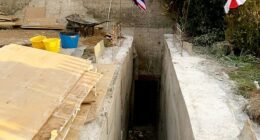The fragile ceasefire between Israel and Iran appeared to be holding on Wednesday after a rocky start, giving rise to cautious hope that it could lead to a long-term peace agreement even as Tehran insists it will not give up its nuclear program.

The ceasefire took hold on Tuesday, the 12th day of the war between Israel and Iran, with each side initially accusing the other of violating it until the missiles, drones and bombs finally stopped.
On Wednesday, US President Donald Trump, who helped negotiate the ceasefire, told reporters at a NATO summit in the Netherlands that it was going “very well”.
“They’re not going to have a bomb and they’re not going to enrich,” Trump said about Iran.
Iran has insisted, however, that it will not give up its nuclear program and in a vote underscoring the tough path ahead, Iranian parliament agreed to fast-track a proposal that would effectively stop the country’s cooperation with the International Atomic Energy Agency, the Vienna-based UN watchdog that has been monitoring the Iranian nuclear program for years.
Ahead of the vote, Iranian parliament Speaker Mohammad Bagher Qalibaf criticized the IAEA for having “refused to even pretend to condemn the attack on Iran’s nuclear facilities” that were carried out by the United States on Sunday.

“For this reason, the Atomic Energy Organisation of Iran will suspend cooperation with the IAEA until security of nuclear facilities is ensured, and Iran’s peaceful nuclear program will move forward at a faster pace,” Qalibaf told lawmakers.
In Vienna, IAEA Director General Rafael Mariano Grossi said he had already written to Iran to discuss resuming inspections of their nuclear facilities.
Among other things, Iran claims to have moved its highly enriched uranium ahead of the American strikes and Grossi said his inspectors needed to re-assess the country’s stockpiles.
“We need to return,” he said.

Questions over effectiveness of US strikes
The American strikes hit three Iranian nuclear sites, which Trump said had “completely and fully obliterated” the country’s nuclear program.
From Tehran Baghaei confirmed that the strikes on Sunday by American B-2 bombers using bunker-buster bombs had caused significant damage.
“Our nuclear installations have been badly damaged, that’s for sure,” he told Al Jazeera on Wednesday, while refusing to go into detail.
Trump’s special envoy to the Middle East, Steve Witkoff, said on Fox News late on Tuesday that Israel and the U.S. had now achieved their objective of “the total destruction of the enrichment capacity” in Iran, and Iran’s prerequisite for talks — that Israel end its campaign — had also been fulfilled.
“The proof is in the pudding,” he said. “No one’s shooting at each other. It’s over.”

Israeli military spokesman Brigadier General Effie Defrin said on Wednesday his country’s assessment was also that Iran’s nuclear facilities had been “significantly damaged” and its nuclear program “set back by years”.
Grossi said he could not speculate on how bad the damage was but that Iran’s nuclear capabilities were well known.
“The technical knowledge is there, and the industrial capacity is there,” he said.
“That no one can deny, so we need to work together with them.”





